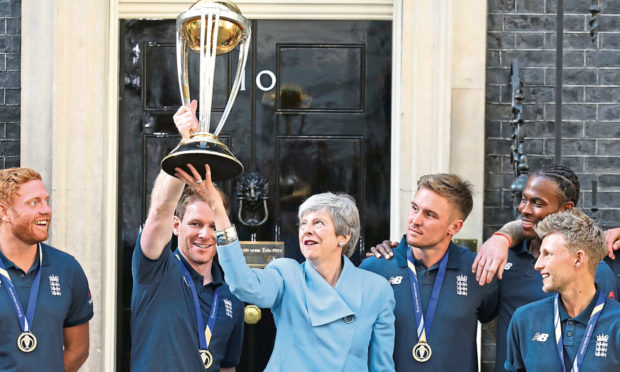The Cricket World Cup drama on BBC radio was bliss.
England victorious at Lord’s – to be English, very heaven (apologies to Wordsworth).
Scots have got beyond seeing England as oppressors or the bad guys – our nationalism has evolved. Scotland is a question for Scots to answer.
England’s World Cup victory at Lord’s felt like the essence of Englishness.
The BBC, cricket’s arcane laws, all at a famous ground – are these not the things that make up England?
The question of England is prominent.
The Brexit vote was essentially about English nationalism.
It is the theme of the Tory leadership race with one poll of party members revealing they’d sacrifice Scotland for little England leaving Europe.
English nationalism is a thing – but is England?
In Scotland, Ireland and Wales, there are national museums.
I went in search of England’s national museum to see what defined the newly assertive land.
In London, there is the British Museum.
As England and Britain are so often synonyms, it is reasonable to assume this museum tells the story of Britishness/Englishness.
It is a neoclassical warehouse of the spoils of empire – magnificently so.
None of the collection is from England or Britain.
Foreign tourists come not to understand Britain, but themselves.
It is instructive on what England is, by virtue of confusing England with everything.
This is an identity so unquestioned, it doesn’t bother to define itself.
The National Gallery in Trafalgar Square is another collection of the world’s best.
The astonishing truth is there is no museum of England in the whole of England.
There is a museum of London and I wondered if that might define Englishness, given its subject is the capital city.
The story, according to the curators, is of a shifting water and mud, the arrival of the Romans, then a lull, before growth and glory in the last millennium.
It never stops to define England, or note its shifting borders over time.
The theme is that London was a global city from the beginning, absorbing invaders and immigrants.
The display is too interested in internationalism to bother with the English nation, and readily blurs England with Britain and empire.
The French laud their great people in the Parthenon while the Americans chipped presidential faces into Mount Rushmore. All other nations in the world celebrate themselves.
But the museums of London celebrate the world.
This speaks to a cultured, gentle Englishness, distasteful of nationalism.
If that country ever existed, it’s not popular today.
Nationalists in the Celtic nations are familiar with English condescension – the implied vulgarity of flags and anthems and self-examination.
Self-examination has been positive – Scottish and Welsh identity is based on tolerance, democracy and fairness.
The Republic of Ireland long forgave England in its heart.
The Celtic nations know who they are and what they stand for.
This process is only beginning in England.
The English nationalists Farage and Johnson presume England is a given – a patriotic land oppressed by Europe.
This has the naivety and silliness of those folk who used to attend SNP conference carrying claymores.
There is a crudeness to the politics of English nationalism, reliant not just on myths about oppression, but the associated gutter thinking of blaming immigrants for somehow ruining pure England.
This is a nationalism in its infancy, inchoate and ugly.
The truth of London’s museums is that it is incredibly difficult to untangle England from the rest of Britain. The involvement of Scotland, Wales and Ireland in shaping England is either denied, or assumed as the first act of empire.
It is clear that the nations of Britain matter less than the conquest of abroad.
Yet Johnsonian nationalism contradicts this by lauding the plucky little England of post-war myth.
His politics are at odds with the capital story, much as Brexit was rejected by London, but supported elsewhere in England.
So is England two things – a global city and the rest?
This incoherence matters because the growing pains of English nationalism will hurt all of us.
The Scots, the Welsh and the Irish will be damaged by Brexit.
This vandalism will continue while the English nationalists try to fathom what exactly England is.
While the Celtic nations agonised over themselves, they did so largely without damaging others (Northern Ireland the obvious exception).
Yet England’s search for meaning is likely to hurt Britain, Europe and maybe the world.
Perhaps the best thing Johnson could do is commission a Museum of England, and bring some English reason to an embarrassing omission.


